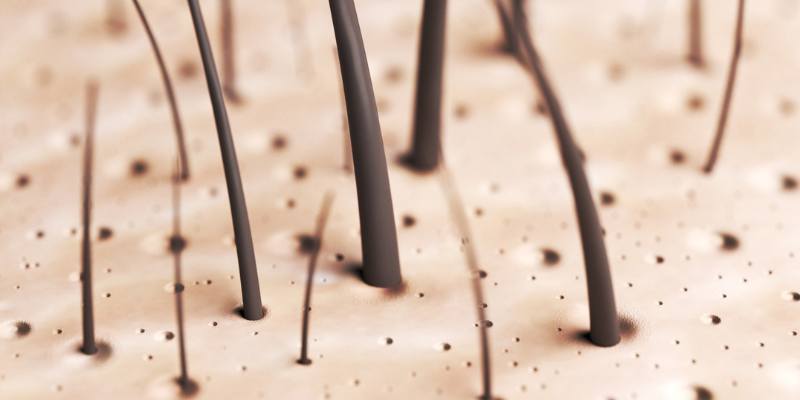Have you ever noticed a smooth, circular patch on your scalp where hair used to be?
If so, you might be one of the millions living with Alopecia Areata worldwide. Unlike hair loss caused by genetics or aging, Alopecia Areata is an autoimmune disease.
This means your immune system, which usually fights off invaders like bacteria and viruses, mistakenly attacks healthy hair follicles.

What is Alopecia Areata?
Alopecia Areata causes hair loss in smooth, round patches, typically on the scalp.
Still, it can affect any hair-bearing area of the body, including eyebrows, eyelashes, and even facial hair. The severity of hair loss varies greatly.
For some, it may be just one or two small patches. Others may experience more widespread hair loss or even complete hair loss (Alopecia Universalis). The exact reason why the immune system targets hair follicles has yet to be fully understood.
However, researchers believe genetics may play a role, and certain triggers like stress or illness might initiate an autoimmune response.
Living with Alopecia Areata: The Emotional Toll
Hair loss can be a significant source of emotional distress, especially for women and children.
Hair is often seen as a symbol of beauty and self-expression. Losing it can lead to feelings of shame, insecurity, and social anxiety. It's important to remember that these feelings are valid.
Although alopecia Areata can be a life-altering experience, there are resources and support systems available to help you cope.
Finding Hope: Treatment Options and Support
Unfortunately, there's no cure for Alopecia Areata.
However, treatment options may help stimulate hair growth or manage the condition.
These include:
- Corticosteroid injections: These injections can be used to suppress the immune system's attack on hair follicles in small patches.
- Minoxidil: This topical medication helps stimulate hair growth in some cases.
- Immunosuppressant medications: These medications are typically used for more severe cases and work by broadly suppressing the immune system.

Beyond Medical Treatments: Coping Strategies
While medical interventions can be helpful, managing the emotional impact of Alopecia Areata is also crucial.
Here are some strategies that can help:
- Connect with support groups: Joining online communities or attending support groups can connect you with others who understand what you're going through. Sharing experiences and emotions can be incredibly validating and help you feel less alone.
- Therapy: Talking to a therapist can be a valuable tool to work through feelings of anxiety, depression, and self-esteem issues related to hair loss.
- Focus on self-care: Prioritize activities that make you feel good about yourself. This could include exercise, spending time in nature, or pursuing hobbies you enjoy.
- Explore different hairstyles: Consider wigs, scarves, hats, or even embracing a shaved head. Many stylish hairpieces are also available to add volume and personalize your look.
- Remember, you're not defined by your hair: Focus on your inner beauty, strengths, and talents. Surround yourself with positive people who value you for who you are, not just how you look.
Living a Full Life with Alopecia Areata
Alopecia Areata can be a challenging condition, but it doesn't have to define your life.
With the proper support, treatment, and a positive mindset, you can learn to manage the emotional impact and live a fulfilling life. Remember, beauty comes in all forms, and confidence comes from within.
At Wig Medical, we believe hair loss shouldn't define you. We empower you to reclaim your confidence and rediscover your beauty.
Explore our comprehensive wig selections online, schedule a complimentary consultation with a certified specialist today, or contact us to learn more.
Let Wig Medical be the partner in your journey to renewed confidence.

Top Six Things You Need to Know about Alopecia Areata
Who can be affected by alopecia areata?
Alopecia areata can affect anyone regardless of age and gender, though most cases occur before the age of 30.
It can also affect people of all ethnic backgrounds.
What causes alopecia areata?
The exact cause of alopecia areata is unknown, but it involves a malfunction of the immune system that destroys the hair follicles.
Genetics may play a role, as those with a family history of autoimmune diseases are at higher risk.
Are there different forms of alopecia areata?
Yes, alopecia areata can vary in severity:
- Alopecia areata (patchy): Small, round patches of hair loss on the scalp or body.
- Alopecia totalis: Complete loss of all hair on the scalp.
- Alopecia universalis: Loss of all hair on the entire body.
What are the symptoms of alopecia areata?
The primary symptom is the sudden appearance of one or more circular bald patches on the scalp or other body parts that grow hair.
These patches are usually smooth and may be peach-colored. Some people may experience tingling or mild discomfort in the affected areas.
How is alopecia areata diagnosed?
Diagnosis typically involves a physical examination of the hair loss and a medical history review. You will want to consult with a Dermatologist for help.
They can write you a prescription for a medical wig covered by insurance. The team at Wig Medical can then provide a Cranial Prosthesis.
A scalp biopsy and blood tests may also be conducted to confirm the diagnosis and rule out other conditions.

What treatments are available for Alopecia Areata?
Treatment for alopecia areata aims to block the immune system attack and stimulate the hair follicle to grow hair again:
- Corticosteroids: Anti-inflammatory drugs that can be administered as injections, oral pills, or topical creams.
- Minoxidil (Rogaine): A topical drug that can help hair grow. Immunotherapy: Chemicals applied to the scalp to induce an allergic reaction that might lead to hair growth.
- Diphencyprone (DPCP): A topical sensitizer used in immunotherapy.
- JAK inhibitors: Oral medications that treat severe cases by blocking specific pathways that lead to inflammation.
- Cranial Prosthetic: A medical wig can offer immediate help with hair loss.
Is there hope for people with alopecia areata?
Yes, many people experience hair regrowth within a year, although the course of the condition varies.
Some may have more extensive or recurrent episodes of hair loss and regrowth.
Advances in treatment are continually being made, and many resources are available for support and management of the condition.

